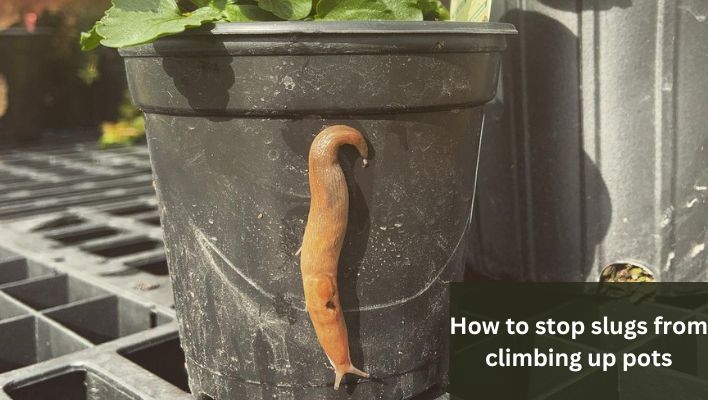If you have a pot garden, there’s a chance your plants will get slug-infested. Slugs aren’t just slimy and gross – they can also be serious pests. If they start eating parts of your plant, you can lose it. It is imperative that you know how to stop slugs from climbing up your pots so you can enjoy beautiful plants all year round.
Slug problems are one of the most common indoor and outdoor gardening issues. They are one of the most common invaders in your garden. They can wreak all sorts of havoc on your plants, so it’s important to know how to keep them at bay.
There are a few ways to prevent slugs from climbing up your pots. You could buy slug pellets; they are safe for pets and children and are effective at repelling and killing slugs. Or you can wrap copper tape around the edges of your pot or the bottom of your pots to stop slugs from climbing. But are these the only way?
There are numerous ways to eliminate and stop slugs from climbing and eating your plants., which are explained below. Use the one most suitable to you, or combine two or more methods for better effectiveness.
How to stop slugs from climbing up the pot
You can prevent slugs from climbing up your plant using slug repellents. Slug repellents are products designed to repel slugs and other pests away from plants. There are many ways to deter slugs from climbing up your pots. Some of the most common methods include:
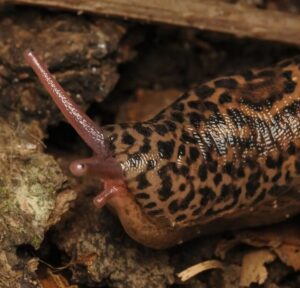
Epsom Salt:
Using Epsom salt is a natural and effective way to deter and kill slugs in your garden. This salt contains magnesium sulfate, known as magnesium sulfate, and is available in gardens and online stores. The crystals in the salt have a molecular structure that makes it harder for slugs to climb up the pot and get inside your house.

It works because it dehydrates them. The salt draws moisture from the slug’s body, which causes it to dry out and die. You can use these salts in several ways. The easiest way to use Epsom salts is to sprinkle some on the bottom of your pot to create a barrier between slugs and your plants. Other methods include
- Sprinkle some on the leaves of your plants
- Rub them all over your plant’s stems and leaves
- Add some to a spray bottle of water and spray around the base of your plant (not directly onto plants)
Use vinegar:
Slugs are attracted to the texture of clay pots, so if you have them climbing up your plants, try this. The vinegar’s acidity will help prevent slugs from climbing onto your plants and damaging them. You can also use it as a pesticide for small insects like aphids. Read more about using vinegar to deter slugs in detail here.

It’s made from fermented grains such as barley and has been used for centuries for the same purpose. Putting a few drops of vinegar on the soil around your plants can be enough to stop slugs from climbing up the pot.
Just make sure that you don’t use too much. Slug repellent can be made by mixing 1 part vinegar with four parts water and a few drops of dish soap. Pour in a spray bottle and mist around your pots and soil to keep slugs away.
Use raised pot feet:
Luckily, there are several ways to stop slugs from climbing up your pots, some of which are easier than others. One of the easiest ways is to use pot feet to raise your pot, so slugs don’t climb up.

These specially designed feet can be attached to the bottom of any pot, making it almost impossible for slugs to climb up into your plants. They’re easy to install, affordable, and available in different designs.
Some pots have feet to keep them above the ground, making them less attractive for slugs to get onto them. Next time, make these features an important consideration when shopping for a pot to keep your plants safe from pests like this.
Buy a special slug pot:
Slugs can climb up pots, so you need to take measures to prevent them from doing so. The best way to do this is to buy a special slug pot.
The slug pot is designed to prevent slugs from climbing up the sides of your plant pots. It comes in different sizes and shapes, and there are also special types of slug pots specifically designed for certain plants.
Buy this post and grow your plants in them. Slugs or snails will not be able to get to your plants. The slug pot will keep the slugs out of your soil, so you won’t have to worry about them damaging your plants.
Use diatomaceous earth:
Diatomaceous earth is a natural substance made from fossilized algae. It is an insecticide and safe for plants, animals, and humans. It’s also effective against slugs, which can climb up your plants by clinging to their leaves and stems. Read here for everything you need to know about using diatomaceous earth to kill and deter slugs.
The small, microscopic particles of diatomaceous earth are sharp and can easily cut through the exoskeleton of a slug, which will kill it. You can sprinkle it around your plants (it works best when there’s a fine layer on top of the soil), or you can use a sprinkler with diatomaceous earth.
To be on the safe side, wear gloves when handling it so as not to ingest any of it into your mouth accidentally. Diatomaceous earth will protect your plants from slug damage and keep them healthy and happy.
Beer traps:
Beer traps are one of the best ways to stop slugs from climbing up your plants. These traps are made of a thin layer of beer that contains spores that kill slugs.
They are then placed around the base of your plant with a thin layer on top to prevent water from getting into the trap. These traps can be made from anything that will hold a few ounces of beer, a plastic bottle, an empty beer can, or even a glass, and they’re easy to set up.
To make the trap:
- Fill the container with beer and let it sit for 24 hours.
- Place it where slugs are likely to come by and wait for them to climb up the container and get stuck in the little hole at the top. It may take several days before they reach the top, but once they do, pour out all of the beer and replace it with fresh beer, so they have something else to climb up into.
Citrus peels:
Citrus peels are rich in citric acid and can treat many pests, including slugs. These peels are also high in vitamin C and make an excellent addition to any compost pile.
How to Use Citrus Peels
To use citrus peels, place them on top of the soil around your plants’ base. You can also add them directly into your compost pile, but you need to ensure that they’re completely dry before adding them (if they’re still moist, they’ll rot quickly). The best way to do this is by storing them in an airtight container until ready for use.
Slugs won’t touch these citrus peels because they don’t like the bitter taste! They will avoid climbing onto them and have trouble moving around on top of them because their feet won’t get stuck. After all, no moisture is left on their shells from staying wet all day.
Companion planting:
Planting hardy plants around the base of your plants will keep slugs away from your garden leaves. This can be done by planting different types of plants around crops that you want to protect from slugs.
This can be done with peas, beans, or other plants you want your tomato plant to grow near. Several plants are known to repel slugs; you can find them in your local garden center or online.
In a pot: Plant marigold (Tagetes erecta) around your plant’s base to keep slugs and snails away. Marigold is also known t attracts beneficial insects that eat other pests like aphids, mealybugs, whiteflies, and many more.
Here are some of our favorite slug-resistant plants and how to grow them:
- Pineapple Sage (Salvia azurea)
- Rosemary (Rosmarinus officinalis)
- Catnip (Nepeta cataria)
- Lemon Balm (Melissa officinalis)
- Borage
- Chamomile
- Nasturtiums
- Garlic
Wool Pellets, or Organic mulches:
Wool pellets or organic mulches are made from the fibers of sheep. They are highly absorbent, making them ideal for your garden to help reduce slug damage.
You can buy these pellets in different sizes and shapes, but the simplest way to use them is to add them to your soil. You’ll need about two inches of organic mulch per square foot of yard space (about 8 pounds per square yard).
The best way to use this is by mixing it with soil before planting anything that needs extra protection from slugs, such as tomatoes or peppers, and then covering it up with plastic once you’ve planted your seeds. The wool pellet will deter slugs from your garden.
You can also use it as a mulch to keep these pests away from your garden. Wool pellets are a great option because they’re sustainable, don’t pose potential health risks to humans or animals, and are cheap. You can buy them in bulk at most nurseries or home improvement stores.
Use Gravel:
Gravel works because it’s not wet, so slugs can’t get a foothold on it. It creates a rough surface around the plant, which keeps slugs away. The gravel acts as a physical barrier and prevents the slugs from climbing up the pot’s surface.
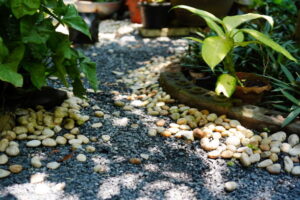
You can use it the same way as a stone to help keep slug damage down. You can use gravel in pots, around the edges of your garden, or wherever else slugs might be a problem. The surface area of these materials is too large and rough for slugs to crawl across, so they’ll be forced to proceed around the edge of the pot instead.
Apply alumina clay:
Alumina clay is also known as aluminum sulfate or aluminum hydroxide, and it can be purchased at most hardware stores. It is an effective and environmentally safe way to keep slugs from climbing up your plants.
You can add alumina clay directly to the soil around your plants or mix it into a liquid solution that you’ll apply with a sprayer.
Alumina clay will draw moisture out of the air and make it hard for slugs to climb up your plants, so they’ll be unable to move as much or as fast. This helps keep them away from your plants, which is great for your gardens.
Create a barrier using copper tape:
You can stop slugs from climbing pots by creating a barrier using copper tape. Copper tape is also effective because it does not matter how wet the soil is or how much rain has fallen; copper tape will not corrode. Copper tape is available at most garden and hardware stores or online.
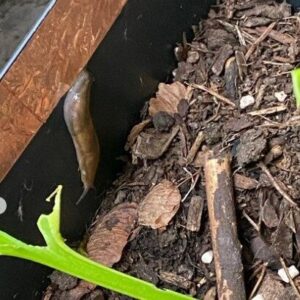
You can wrap this tape around the edges of your planter to prevent these pests from climbing your pots. Also, you can wrap the foil around the stem of your plant until there’s enough for the distance between where you want the slug to go and where it goes (this will be about five inches).
Then, wrap the tape around both sides of this “barrier” and secure it with wire ties or string so there’s no way for them to get through.
Vaseline to stop slugs:
If you want to stop slugs from coming into your garden, you can use Vaseline. This will make the ground slippery and hard for slugs to walk on. It will also keep them from eating your plants.
You can find Vaseline in any store that sells household products. Use a little Vaseline on your hands and smear it across the top of your garden’s soil. You can apply Vaseline to the soil around the base of your plant or around the planters to prevent them from climbing unto it.
The oil in Vaseline will repel slugs away from the base of your plant and keep them from climbing up it. Below are the various ways to use Vaseline to repel slugs from your plants.
Does salt kill slugs?
Salt is a common home remedy for killing slugs because it’s very effective at dehydrating them. Salt has several different effects on slugs and other pests, but one of the most important is that it lowers the water content in their bodies, causing them to dehydrate.
This makes them more susceptible to heat and light, which can kill them outright or cause them to go into shock and die slowly over time. This makes them easier to remove with your vacuum cleaner or broom. You can also use salt to make a paste that you can spread on the ground around your plants and other gardens. Salt is also a disinfectant, so it kills germs and viruses.
Slugs are very quick and can hide in the soil and underneath leaves and debris. However, salt will only kill them if they have contact with it, which means that if you sprinkle salt on the surface of your garden, it will only kill slugs that come in contact with it.
If you want to use salt to kill slugs in your garden, sprinkle it around the edges of your plants where they are most likely to come into contact with it. It will corrode the slug’s shell and dehydrate the slug when it dries. So this method is another good method to keep slugs away from your pot.
You can do this by spreading salt around the edges of your pot or at the base of your plant to keep these pests away from your pot entirely.
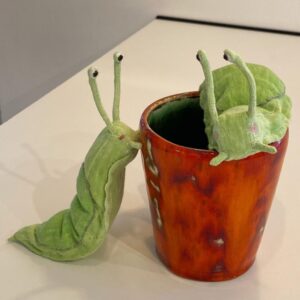
Does wd40 stop slugs?
WD-40 is a water-displacing lubricant that is great for all machinery and tools. It’s not just for cars, either. WD-40 can be used on your lawnmower, chainsaw, or other machinery needing lubrication.
WD-40 is made from mineral spirits and contains no petroleum byproducts. When applied to the surface of anything, it displaces moisture from the air. This creates a thin layer of protection over whatever you’re working on.
WD40 does stop slugs from climbing up pots. It’s an oil with a slippery consistency and smells like a campfire. The easiest way to apply it is to squirt some on your fingers and then rub it on the inside of the rim of your pot, just below where the slug climbs in.
This can be effective for several reasons: Slugs don’t like the feeling of wd40 on their skin (and they won’t climb up anything that feels slimy). WD40 has a slight odor that repels them, which is why you often see slugs walking away from you when spraying this stuff around your plants.
Also, WD-40 is an excellent choice because it’s a water-displacement product that displaces moisture and oil from surfaces. This makes it effective at repelling slugs and other slimy pests like snails, which are typically attracted to wet surfaces.
The best part about using WD-40 for this purpose is that it’s safe for people, pets, and plants. As long as you don’t get any on your skin or in your eyes (or mouth), you won’t have any adverse effects from using the product.
